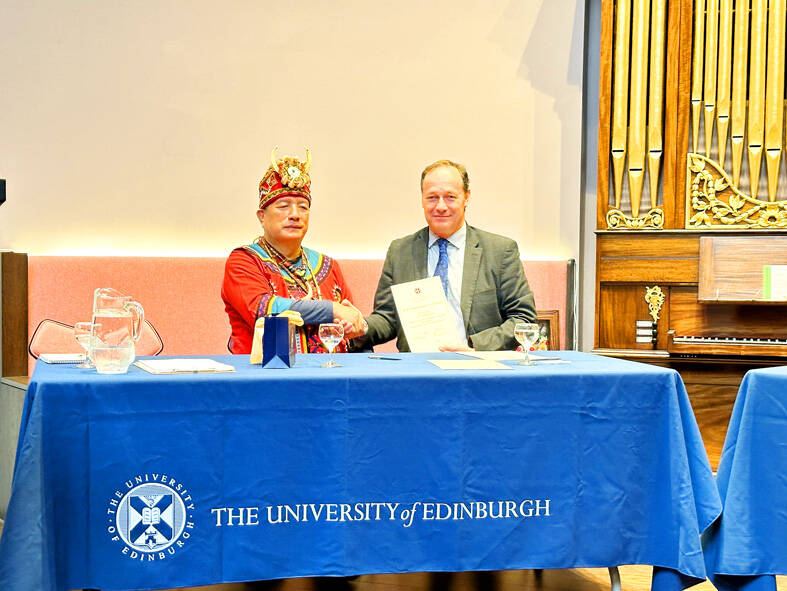The University of Edinburgh on Friday officially returned the skulls of four Paiwan warriors taken by Japanese in 1874 to the Taiwanese indigenous community, marking Taiwan’s first-ever international repatriation of ancestral remains.
The Scottish university’s vice principal Gavin McLachlan at a ceremony at the school’s St Cecilia’s Hall signed the repatriation documents to formally transfer the skulls, which had been stored at the university for over a century.
“This repatriation is a culmination of international cooperation between the university and the Taiwanese community,” anatomy academic Tom Gillingwater was quoted as saying in a statement.

Photo courtesy of the Council of Indigenous Peoples via CNA
The human remains were received by Mudan Township (牡丹) Mayor Pan Chuang-chih (潘壯志), with Council of Indigenous Peoples Deputy Minister Calivat Gadu and others as witnesses.
Mudan Township is home to many Paiwan people, the second-largest indigenous group in Taiwan.
The skulls were taken by Japanese during an 1874 punitive expedition into Shimen, in today’s Mudan Township, known as the “Mudan Incident,” which was launched in response to the massacre of 54 shipwrecked Ryukyuan sailors by Paiwan warriors three years earlier.
The remains were in 1907 given to the school, which holds one of the largest and most historically significant collections of ancestral remains, notably skulls, the university said in its statement.
They were thought to have been originally taken as war trophies by Japanese soldiers and were carried to Japan by an unnamed US Navy officer who had accompanied the Japanese as a military adviser, it said.
Before they reached the university, the skulls were in possession of Stuart Eldrige, a US doctor and skull collector living in Yokohama in Japan, and John Anderson, the first curator of the Indian Museum in Calcutta, it added.
The university said it has a long history of returning remains and items in its collection that came from the British Empire’s colonies or through their global networks, with the first repatriation taking place over 75 years ago.
“We are committed to addressing our colonial legacy and this repatriation is the latest action we have taken in line with our longstanding policy of returning items to appropriate representatives of the cultures from which they were taken,” Gillingwater was quoted as saying.
The Council of Indigenous Peoples first requested the return of the four skulls on behalf of the Paiwan people in 2021 and received a positive response from the University of Edingburgh last year, the council said in a statement.
The repatriation not only upholds the principles of the UN Declaration on the Rights of Indigenous Peoples, but also raises global awareness of the human rights of indigenous peoples, the council said.
“It holds profound historical significance and stands as an important milestone in the pursuit of transitional justice for indigenous peoples,” it said.

Taipei, New Taipei City, Keelung and Taoyuan would issue a decision at 8pm on whether to cancel work and school tomorrow due to forecasted heavy rain, Keelung Mayor Hsieh Kuo-liang (謝國樑) said today. Hsieh told reporters that absent some pressing reason, the four northern cities would announce the decision jointly at 8pm. Keelung is expected to receive between 300mm and 490mm of rain in the period from 2pm today through 2pm tomorrow, Central Weather Administration data showed. Keelung City Government regulations stipulate that school and work can be canceled if rain totals in mountainous or low-elevation areas are forecast to exceed 350mm in

EVA Airways president Sun Chia-ming (孫嘉明) and other senior executives yesterday bowed in apology over the death of a flight attendant, saying the company has begun improving its health-reporting, review and work coordination mechanisms. “We promise to handle this matter with the utmost responsibility to ensure safer and healthier working conditions for all EVA Air employees,” Sun said. The flight attendant, a woman surnamed Sun (孫), died on Friday last week of undisclosed causes shortly after returning from a work assignment in Milan, Italy, the airline said. Chinese-language media reported that the woman fell ill working on a Taipei-to-Milan flight on Sept. 22

COUNTERMEASURE: Taiwan was to implement controls for 47 tech products bound for South Africa after the latter downgraded and renamed Taipei’s ‘de facto’ offices The Ministry of Foreign Affairs is still reviewing a new agreement proposed by the South African government last month to regulate the status of reciprocal representative offices, Minister of Foreign Affairs Lin Chia-lung (林佳龍) said yesterday. Asked about the latest developments in a year-long controversy over Taiwan’s de facto representative office in South Africa, Lin during a legislative session said that the ministry was consulting with legal experts on the proposed new agreement. While the new proposal offers Taiwan greater flexibility, the ministry does not find it acceptable, Lin said without elaborating. The ministry is still open to resuming retaliatory measures against South

1.4nm WAFERS: While TSMC is gearing up to expand its overseas production, it would also continue to invest in Taiwan, company chairman and CEO C.C. Wei said Taiwan Semiconductor Manufacturing Co (TSMC) has applied for permission to construct a new plant in the Central Taiwan Science Park (中部科學園區), which it would use for the production of new high-speed wafers, the National Science and Technology Council said yesterday. The council, which supervises three major science parks in Taiwan, confirmed that the Central Taiwan Science Park Bureau had received an application on Friday from TSMC, the world’s largest contract chipmaker, to commence work on the new A14 fab. A14 technology, a 1.4 nanometer (nm) process, is designed to drive artificial intelligence transformation by enabling faster computing and greater power